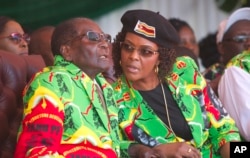The claims that Zimbabwe's first lady, Grace Mugabe, assaulted a young woman in an upscale Johannesburg hotel have grabbed international headlines for their sordid details — and self-posted pictures of the alleged victim's deep wounds.
The incident also has created a major diplomatic headache for two countries that have very delicate relations. The two nations are major trade partners. In recent years, however, instability and economic woes have sent millions of Zimbabweans fleeing to South Africa, where they form a loud and angry diaspora that almost unanimously calls for South Africa to condemn President Robert Mugabe, who has been in power since 1980.
The allegations against Grace Mugabe have thrown these larger issues into sharper focus.
Immune or not immune?
A spokesman for South Africa's department of international relations said the department would not comment on the matter.
It is that department that has the difficult job of deciding whether to grant Grace Mugabe's request for diplomatic immunity — meaning she cannot be prosecuted — over the incident that allegedly occurred this past weekend. Mugabe failed to appear before police to give a statement Tuesday.
On Thursday, legendary South African prosecutor Gerrie Nel — nicknamed the Bulldog, the same prosecutor who eventually achieved a murder conviction against Oscar Pistorius — said his organization, Afriforum, would provide legal representation for the victim.
Nel says Mugabe's request for immunity should not be granted, on the grounds that initially she said she was visiting South Africa for medical treatment and not, as she now says, to attend a regional summit alongside her husband.
"It's not automatic. There's lots of prescriptions and things that should be followed before somebody can claim immunity," Nel said.
The attack
On Sunday, Gabriella Engels, the woman who claims that Grace Mugabe attacked her, posted details of her ordeal on Twitter, along with graphic photos of a deep cut on her forehead from the extension cord she says Mugabe used to beat her. She did not speak Thursday — Nel says she will not do so until she is put on the stand at trial.
In a tweet, Zimbabwe's ruling ZANU-PF party claims Grace Mugabe was the victim, saying, "We can confirm if this is one of the perpetrators who attacked comrade Grace Mugabe."
Engels' legal team also says she was approached this week by a third party — which they did not name — offering an out-of-court settlement if she dropped the charges. Engels says she will not.
Bigger picture
But will a trial ever happen? Zimbabwe scholar David Moore of the University of Johannesburg says South Africa's government is in a very sticky position — whether to hurt international relations by prosecuting Mugabe, or whether to weaken its already heavily criticized judiciary by letting her go.
And, he says, there's another wrinkle: Mrs. Mugabe is positioning herself to be her aging, ailing husband's successor. She already leads one faction of his ruling ZANU-PF party, and is trying to win favor over Mugabe's vice president.
"Now if Grace Mugabe is disgraced through this event in South Africa … you'd have a very unpopular leader of a party, and a very temporary leader, because she's volatile, as we can see," Moore said. "That would lead to more uncertainty on the borders of South Africa. So, South Africa now has to worry about how they handle this situation with Grace Mugabe, how this will affect politics in Zimbabwe."
There is yet another wrinkle: In recent weeks, South African President Jacob Zuma has drawn criticism for not acting decisively enough in condemning a deputy minister who faces assault charges himself. Furthermore, that official was not immediately arrested and was given what many critics say was preferential treatment once he finally appeared at a court and admitted to the assault.
It is anyone's guess what might happen next in the Mugabe case, according to Zimbabwean analyst Pedzisai Ruhanya, the head of the Zimbabwe Democracy Institute.
"Under normal circumstances," he said, a case like this one, "would create some kind of [mis]understanding between Harare and Pretoria. Beating a woman, repugnant as it is ... It is not something that appears to shock Zuma."
And where is Grace Mugabe in all of this? Will she appear at the regional summit that she says she traveled to South Africa to attend?
South African officials say she is still in the country, but have not disclosed her location. Local media has reported that she recently purchased a lavish mansion in a Johannesburg suburb.
Sebastian Mhofu contributed to this report from Harare.






